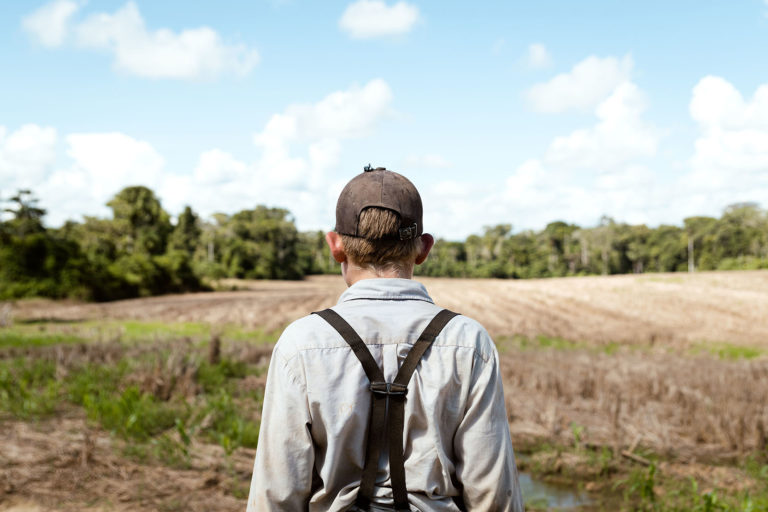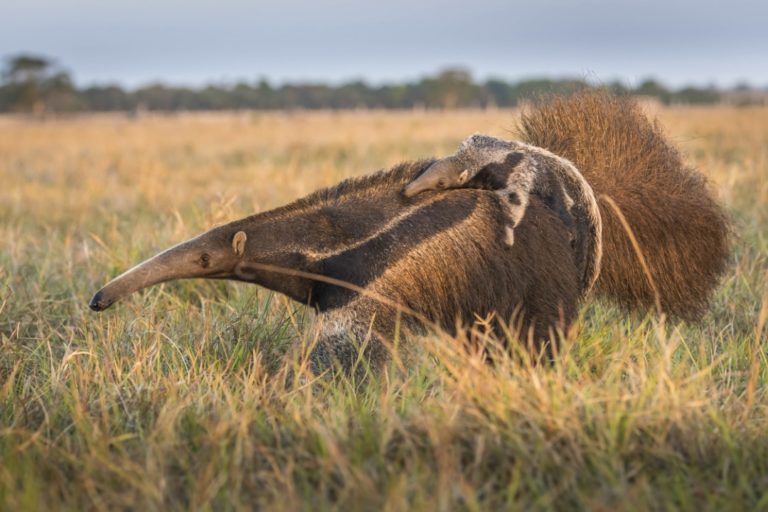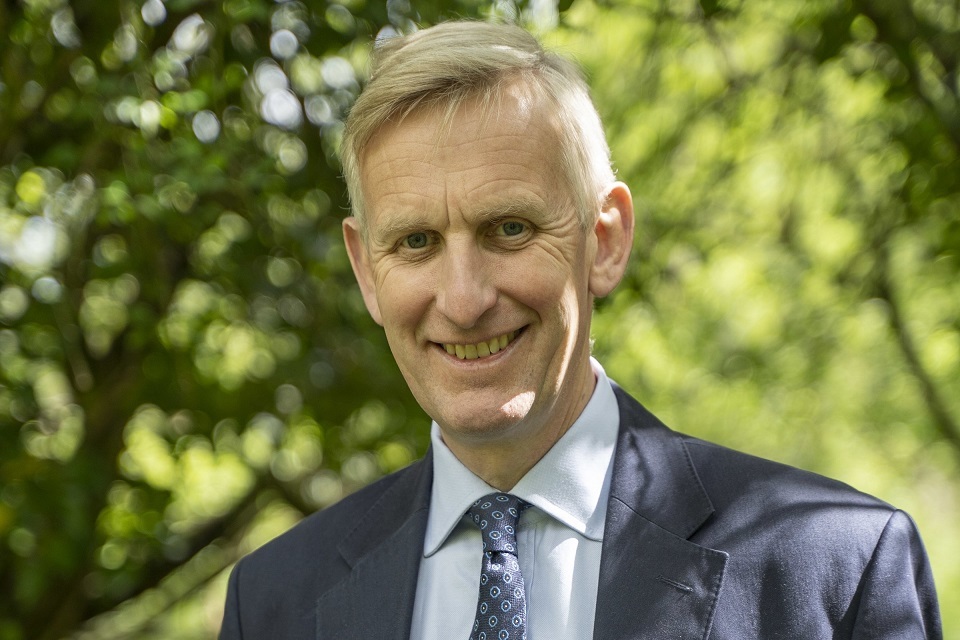“The forest will never end,” says Papa Mbembe as he treks through the swampy peatland of the rainforest behind his village in the Democratic Republic of the Congo (DRC), nearly 400 miles from the capital, Kinshasa.
Walking barefoot, and dressed in a T-shirt and rolled-up jeans, he points to the ferns, lianas and hardwood trees rising high into the canopy. He hunts small woodland antelope, collects timber for his house and is an expert in traditional medicine.
He scrapes the bark of a boala tree with his machete and collects the powder in a large tropical leaf, explaining how he will boil this up with other forest leaves and roots to treat stomach ache.

He points out more trees with medicinal properties: the bark of the molengu (Daniellia pynaertii) tree is regarded as an aphrodisiac and the bolaka (Symphonia globulifera) cures an aching back. His expert knowledge of the forest is extensive – he also fishes in its rivers and harvests fruit such as mapapa from the boala tree (Pentaclethra macrophylla) and from the momboya tree (Artocarpus sp.).
“I have lived all my life in the forest; everything I do is in the forest,” he says. “The forest provides my food and my medicine.”
But beneath his feet lies something even more precious: dense layers of peat formed over millennia creating a carbon store that holds the equivalent of three years’ of global fossil fuel emissions.
Now this forest is under threat from plans to exploit other natural resources. As well as creating new logging concessions, the DRC government is selling permits for oil and gas exploration. As well as the peatlands in the north-west of the DRC, the drilling permits also cover Virunga national Park in the east of the country, home to mountain gorillas and the critically endangered lowland gorilla.
The auction has raised concerns about the future of a forest protection deal signed by the former British prime minister Boris Johnson, on behalf of the Central African Forest Initiative (Cafi), and the DRC president, Félix Tshisekedi, at Cop26.
"html":"The forest is rich, it is our natural wealth. The forest is here for everybody","attribution":"Papa Ikomo, head of the village"
Papa Mbembe’s village is a line of mud-and-thatch houses strung along a riverbank, shaded by mango and palm trees. The only way to get there is by boat along the Ruki River and, for a villager without an outboard motor, it takes 24 hours to reach the nearest town.
As well as an essential source of food and wood, the forest has a strong spiritual value for those who live there. Papa Mbembe says the medicines he makes get their power from the spirits of the ancestors, who dwell in the forest. “People need to respect the spirits of the forest.”
The heads of villages, or nkumu, are believed to be directly in touch with the sprits of the ancestors and derive their authority from them. In this village the nkumu is Papa Ikomo, a wiry man in his 50s with facial expressions that change in a flash from relaxed humour to towering authority.

“The spirits of the ancestors are in the forest and in the swirling water. But other people cannot see them, only I can see them,” he says. “They come to me in dreams and I see them as clearly as I see you now.”
As a direct descendent of the founder of the village, Papa Ikomo holds customary rights to the forest. The whole landscape belongs to the village, according to tradition. You can walk for a day in each direction and come nowhere close to the village boundaries. The forest stretches as far as the eye can see.
Papa Ikomo extends his arms wide to indicate the scale of the forest. “The forest is rich, it is our natural wealth,” he says.
Everyone in the village can fish, collect fruit and wood, fell trees for logs and make charcoal. There are no restrictions on where people can go or what they can do. “The forest is here for everybody,” he adds.

The full map of DRC’s peatlands’ carbon stock was published only a few months ago and, before 2017, the existence of peat in the Congo basin was a matter of speculation. The peat accumulated over 10,000 years or more, formed from leaves and plant roots trapped under water in the flooded depressions between tributaries of the Congo River. Not only is the DRC’s peatland rainforest a vital carbon store, it is also a place of huge biodiversity, much of which has yet to be documented.
The government of DRC is selling permits for oil and gas exploration in dozens of blocks, which cover 240,000 sq km (150,000 sq miles), of which at least 10,000 sq km are in peatland rainforest. The government insists it has a sovereign right to use its natural resources to increase economic growth in the DRC.
Infrastructure development in the peatlands, however, changes the delicate hydrology of the forest, say experts. Building roads and installing equipment requires the land to be drained, drying out the peat, exposing it to oxygen and triggering the release of carbon.
Julien Mathe, coordinator of the Action Group to Save Man and his Environment, a community organisation based in Mbandaka, the capital of Équateur province, says the people who live in the forest should be at the forefront of any conservation initiatives. Villagers have no say in the auction of the forest because it is all owned by the state.

Mathe helps local people to formalise their land rights as community concessions. “This is the way to protect the peatlands. The villages with peatlands forest have managed it for a very long time,” he says. “We need to work with the people for its protection.”
It is impossible to farm in the peatlands as it is so swampy, he explains, adding: “The peatlands forest is of paramount importance for the fish, because they lay eggs in the water beneath the trees. People’s main livelihood is fishing.”
Mathe and his team visit the villages along the rivers and talk to them about conserving the peatland forest. “We need holistic planning; we need to work with the people to protect all the forest,” he says.
Companies with concessions are required to abide by the Forest Law, and environmental organisations such as Mathe’s try to hold them to account. “We collect evidence of what the companies do wrong, and bring people together to agree on a way forward,” he says.
In Papa Ikomo’s village, none of them knew about the prospect of oil drilling. They have very little contact with the state – the teachers in the primary school are volunteers paid by the parents.
The villagers do not see any change ahead. Papa Ikomo remains confident in the permanence and abundance of the forest. “This is something that comes from God,” he says. “It will never end.”
Find more age of extinction coverage here, and follow biodiversity reporters Phoebe Weston and Patrick Greenfield on Twitter for all the latest news and features


